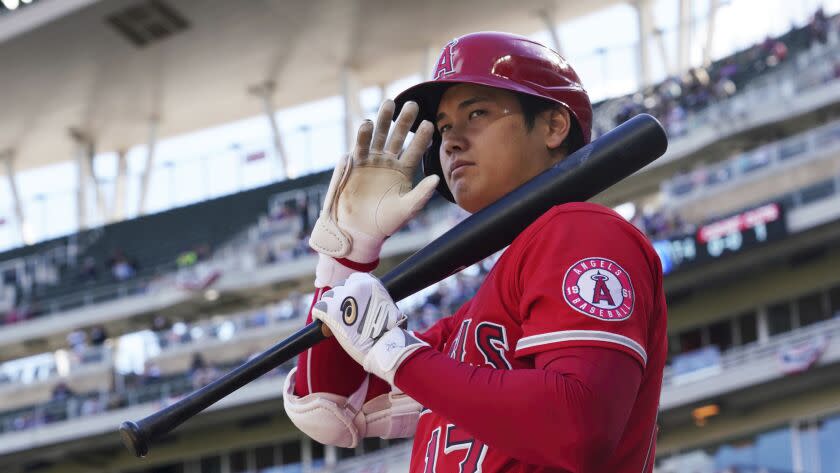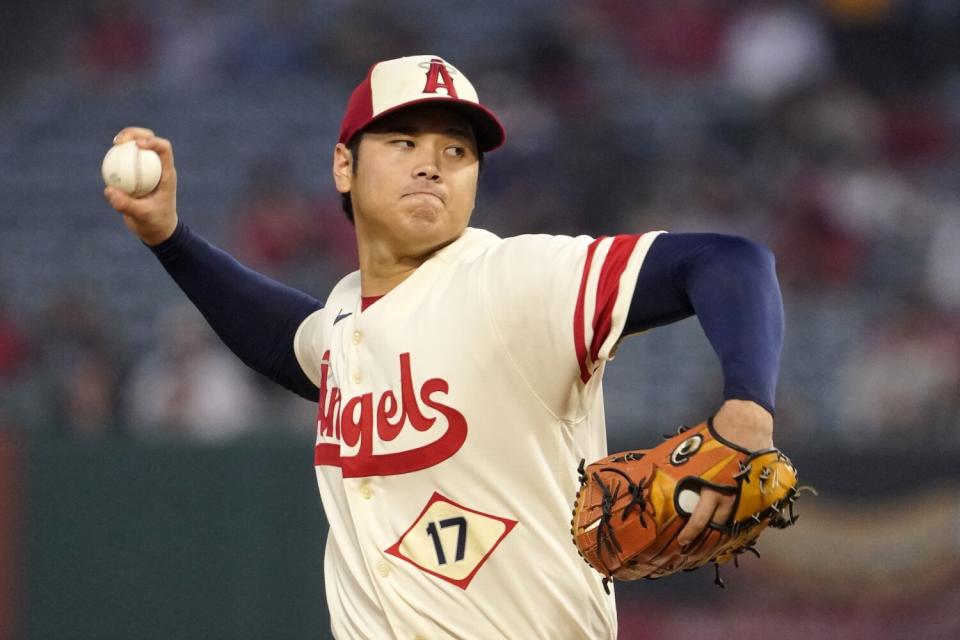Hernández: Dodgers' puzzling offseason strategy can be justified by signing Shohei Ohtani next year

Back in the city where their season ended, the Dodgers resorted to familiar behavior this week. Like their hitters in October, their executives froze in the batter’s box at baseball’s winter meetings.
Justin Verlander signed with the New York Mets.
Strike one.
Trea Turner abandoned them for the Philadelphia Phillies.
Strike two.
Aaron Judge returned to the New York Yankees.
Strike three.
There is plenty of time remaining in the offseason and there are plenty of high-caliber players who remain on the market, but read between the lines of what Andrew Friedman and Dave Roberts are saying, and it’s clear the plan is for them to keep their payroll under the luxury-tax threshold unless an irresistible bargain suddenly materializes.
There’s only one way for the Dodgers to justify this head-scratching approach.
When Shohei Ohtani becomes a free agent next winter, they have to sign him.
Otherwise, what are they doing?
This feels like a dangerous game the Dodgers are playing, as their cost-saving strategy could result in them sacrificing what remains of the window in which their two best hitters will both be elite performers. Mookie Betts is 30 and Freddie Freeman is 33.
And even if the Dodgers can pursue Ohtani next winter without worrying about the penalties associated with being a repeat luxury-tax offender, there’s no guarantee they will land him.
The winter meetings next year will be the Ohtani meetings, with the Japanese two-way player expected to be in position to sign the most lucrative contract in the sport’s history.
Ohtani was already the subject of rampant speculation at the meetings this week at the Manchester Grand Hyatt, as the 28-year-old will be eligible to test the open market when his one-year, $30-million deal with the Angels expires at the conclusion of the 2023 season.
“If he stays healthy,” said one team owner, “who knows how much he’ll get?”
These are prosperous times in the game, Judge signing for $360 million, Turner for $300 million and Jacob deGrom for $185 million with the Texas Rangers.
Judge and Turner can’t pitch, deGrom can’t hit. What’s the value of Ohtani, who can do both?
Team executives with whom I spoke to this week said they expected Ohtani to sign a deal worth more than $400 million, with some of them wondering if he could break the $500-million barrier.

Whether the Angels’ next owner is willing to make the necessary financial investment to retain Ohtani, the assumption around the game is that he’s a goner, as he has voiced displeasure with the team’s inability to win.
In a recent interview with the Japanese sports publication Number, Ohtani said he was prepared to be traded last season, as a deal would have made sense for the Angels had they taken a “long-term view” of their situation. It doesn't sound as if he intends to stay, does it?
In the same interview, Ohtani mentioned the reality that not every team could afford him.
“The teams to which a player with a high salary can go will always be limited,” Ohtani said in Japanese, “and in many instances, the player will have to go to a team to which the luxury tax doesn’t matter.”
A team like the Dodgers, who have paid close to $200 million in luxury taxes under their current owners.
The Dodgers came close to signing Ohtani when he was in high school. They made another attempt to sign him when he moved to the major leagues five years ago.
A prominent agent who has no affiliation with Ohtani said the Dodgers’ inquiries about his clients haven’t advanced beyond the initial stages and offered this theory: “They’re getting ready to make a run at Ohtani.”
But would Ohtani want to play for the Dodgers? That’s an unknown.
One scout who has followed Ohtani since high school pointed to how he wants to do things others haven’t.
Over the years, Ohtani has resisted suggestions to abandon either hitting or pitching. The year before he came to the United States, his former high school coach and trusted adviser Hiroshi Sasaki was skeptical that he would sign with the Dodgers or Yankees, speculating that he would pick a team that didn’t have an extensive history with Japanese players.
Ohtani revealed this year that he timed his move to the major leagues not to maximize his earnings but to maximize his chances of becoming a Hall of Famer.
The aforementioned scout wondered if Ohtani would consider a move to the Dodgers as too conventional a choice.
At the same time, there are indications that Ohtani’s views of his profession have evolved. When he spoke to Number, he explained the perception of trades in the United States is different than it is in Japan, where they are seen as evidence that a team has given up on a player.
So, who knows, maybe five losing seasons with the Angels has convinced Ohtani that reaching the World Series will require him to take the road most traveled.
The Dodgers better hope that’s the case.
This story originally appeared in Los Angeles Times.
